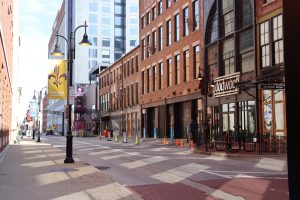OPINION: Supporting the Black dollar following Black Friday
December 6, 2020
We finally made it out of the red; and no, I’m not talking about COVID-19 cases.
Black Friday is a pastime for many Americans, where families nationwide prepare for holiday deals and stretch their wallets to get the most bang for their buck. This day serves as a financial rejoice for businesses and customers alike.
“… after an entire year of operating at a loss (“in the red”) stores would supposedly earn a profit (“went into the black”) on the day after Thanksgiving, because holiday shoppers blew so much money on discounted merchandise,” Sarah Pruitt of History Channel Website said.
In previous years, following a good Thanksgiving meal and family time, people would gather to browse catalogs or rewind commercials in order to find discounted gifts to buy. Others would take things to the next level, working collaboratively to complete the gift list and even camping out in front of stores to be the first in line. For many, the rush of customers, long lines and competitive prices were the highlight of their holiday season.
Unfortunately, this chaotic normalcy wasn’t quite the reality this year.
COVID-19 cases in Kentucky have continued to worsen, seeing a high positivity rate of almost 10 percent and around 4,000 newly reported cases this week alone.
Kentucky Governor Andy Beshear released a new mandate on Nov. 18th, which pushed for smaller family gatherings and for restaurants to seize dine-in options, in an attempt to shrink the growing number of cases. These guidelines, coupled with the intensity of the pandemic, prompted consumers to adjust their traditional Black Friday practices.
In turn, online shopping became wildly popular.
Consumers spent over $9 billion on online Black Friday sales, which rose to almost $13 billion by Cyber Monday. Online shopping sales experienced a 22 percent surge, compared to 2019 statistics.
While these numbers may be encouraging to big-box or chain retailers such as Walmart, Target, Apple and the like, they take away from consumer dollars that could be spent locally.
Prior to the pandemic, Louisville was seeing a steady increase of local stores selling jewelry, homemade goods, vintage clothing and custom shoes. Focus was starting to shift more towards stimulating local economic growth and supporting small business, evident in the creation of NuLu and many other new startups.
Then COVID-19 hit. Approximately 300 Louisville businesses had to permanently closed due to the pandemic. Surviving local businesses and services are faced with only a fraction of their previous clientele. Those left continue to struggle financially, most barely keeping afloat as things drag on.
Business owners and entrepreneurs from around Louisville elaborate on the pressures the pandemic has had on both their professional and personal lives.
“I had to prioritize my family. I have to prioritize their wellbeing, but how can I do that when I am missing money to pay bills? If I can’t keep the lights on or the house warm, am I still prioritizing them?” Channing Banks, C.E.O of Lead D.O.G Unlimited, said.
“It’s just hard as an esthetician because you have to physically work with people to stay afloat. It makes you wonder if it is really worth it,” Jade Sims, founder of Sultry Lash and Beauty, said.
Local Black owned businesses face even greater adversity. Misconceptions and stereotypes have led some consumers to believe that Black entrepreneurs are unprofessional, too expensive, take too long to ship or are too untrustworthy.
This lack of trust is not simply a black and white issue. During the surge of Black owned businesses and entrepreneurship a few months ago, most Black consumers weren’t even supporting their own businesses. Instead, they chose to purchase familiar brands and more cost efficient products.
The reason products from Black owned businesses are often more expensive is because their items aren’t mass produced like big-box retailers, so the bulk of money made is delineated to production. After the costs of production, shipping and operational costs, little money is left to pay employees or for the owners themselves. If more consumers purchased these products, the cost would actually go down. Businesses would also be able to generate greater profit by selling more goods. This cycle will only be possible if people begin to shift back to shopping locally.
The upkeep of owning and operating a Black owned business has become even more brutal in the midst of the pandemic, where these entrepreneurs are forced to tackle COVID dilemmas on top of pre-existing challenges.
“There isn’t many of us [Black people] running our own business as it is. With COVID it’s like they’re trying to take us out for good. I have owned my salon for over 20 years and have had clients since I was a teenager. We’re [the salon and beauticians] are hanging in there but, that’s true for everyone,” Johnetta Coleman, owner of Off da Hook Salon, said.
“I am new to this business world but I do know what I like. I appreciate punctuality and professionalism so I try to provide that as a business owner. As an smaller business owner, I have to hold on to everyone I got,” Tarcia Parker, owner of Bella Notte Boutique, said.
Shopping locally helps simulate economic improvement within our own communities, which in turn helps attract tourism, urban planning and other benefits for the city of Louisville. If more individuals purchased local goods, they would lower overall costs while simultaneously supporting neighbors. Your purchases can help pay for websites, shipment costs, an electricity bill or even help create a new display sign. When shopping local, even the smallest purchases can create a big impact in the city we call home.








